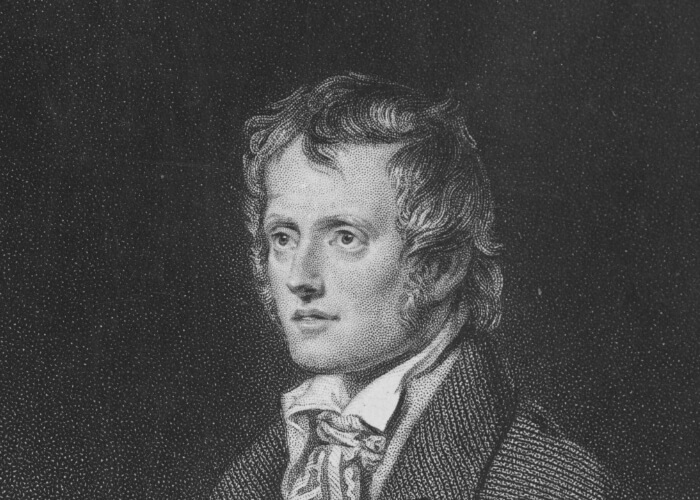> Funeral Poems > John Clare
John Clare - Best 2 Funeral Poems [Includes PDF & Audio]
Venture into the heartfelt universe of John Clare with our chosen compilation of three evocative funeral poems. This page delicately unravels Clare's keen observations on the essence of loss, grief, and the solace that can be found in remembrance.

Looking for a Funeral Director?
Contact someone today
1) Love Lives Beyond The Tomb
Please note the audio recording may not exactly match the text version as poems are sometimes tailored/personalised.
Love Lives Beyond the Tomb
And earth, which fades like dew:
I love the fond,
The faithful, and the true.
Love lives in sleep:
Tis happiness of healthy dreams:
Eve‘s dews may weep,
But love delightful seems.
Tis seen in flowers,
And in the morning‘s pearly dew;
In earth‘s green hours,
And in the heaven‘s eternal blue.
Tis heard in Spring
When light and sunbeams, warm and kind,
On angel‘s wing
Bring love and music to the mind.
And where‘s the voice,
So young, so beautiful, and sweet
As Nature‘s choice,
Where Spring and lovers meet?
Love lives beyond the tomb,
And earth, which fades like dew:
I love the fond,
The faithful, and the true.
And earth, which fades like dew:
I love the fond,
The faithful, and the true.
Love lives in sleep:
Tis happiness of healthy dreams:
Eve‘s dews may weep,
But love delightful seems.
Tis seen in flowers,
And in the morning‘s pearly dew;
In earth‘s green hours,
And in the heaven‘s eternal blue.
Tis heard in Spring
When light and sunbeams, warm and kind,
On angel‘s wing
Bring love and music to the mind.
And where‘s the voice,
So young, so beautiful, and sweet
As Nature‘s choice,
Where Spring and lovers meet?
Love lives beyond the tomb,
And earth, which fades like dew:
I love the fond,
The faithful, and the true.
Read more about this poem
2) All Nature Has A Feeling
Please note the audio recording may not exactly match the text version as poems are sometimes tailored/personalised.
All nature has a feeling: woods, fields, brooks
Are life eternal: and in silence they
Speak happiness beyond the reach of books;
There's nothing mortal in them; their decay
Is the green life of change; to pass away
And come again in blooms revivified.
Its birth was heaven, eternal it its stay,
And with the sun and moon shall still abide
Beneath their day and night and heaven wide.
Are life eternal: and in silence they
Speak happiness beyond the reach of books;
There's nothing mortal in them; their decay
Is the green life of change; to pass away
And come again in blooms revivified.
Its birth was heaven, eternal it its stay,
And with the sun and moon shall still abide
Beneath their day and night and heaven wide.
Read more about this poem
History & Information about poet John Clare
John Clare was an English poet born on July 13, 1793, in Helpston, Northamptonshire, England. He was the son of a farm laborer and received only a limited formal education. Despite this, he developed a love for literature and began writing poetry at a young age.
Clare's early poetry was heavily influenced by the natural world and the rural landscape in which he grew up. His first book of poetry, "Poems Descriptive of Rural Life and Scenery," was published in 1820 and was well-received by critics.
In 1821, Clare traveled to London, where he met several other poets and writers, including John Keats. However, his time in London was not successful, and he returned to his hometown in 1822.
Clare continued to write poetry throughout his life, but his mental health began to decline in the 1830s. He spent time in a private asylum and was eventually moved to a public asylum, where he spent the rest of his life.
Despite his struggles with mental illness, Clare continued to write poetry, and his works continued to be published. He is known for his vivid descriptions of rural life and the natural world, and his poetry has been praised for its beauty and simplicity.
John Clare died on May 20, 1864, at the age of 70, in Northampton, England. He is remembered as one of the most important poets of the Romantic era and a significant voice in English literature. His works continue to be read and appreciated by readers around the world.
Clare's early poetry was heavily influenced by the natural world and the rural landscape in which he grew up. His first book of poetry, "Poems Descriptive of Rural Life and Scenery," was published in 1820 and was well-received by critics.
In 1821, Clare traveled to London, where he met several other poets and writers, including John Keats. However, his time in London was not successful, and he returned to his hometown in 1822.
Clare continued to write poetry throughout his life, but his mental health began to decline in the 1830s. He spent time in a private asylum and was eventually moved to a public asylum, where he spent the rest of his life.
Despite his struggles with mental illness, Clare continued to write poetry, and his works continued to be published. He is known for his vivid descriptions of rural life and the natural world, and his poetry has been praised for its beauty and simplicity.
John Clare died on May 20, 1864, at the age of 70, in Northampton, England. He is remembered as one of the most important poets of the Romantic era and a significant voice in English literature. His works continue to be read and appreciated by readers around the world.
Main Categories

See links below:
Popular Poems

See links below: